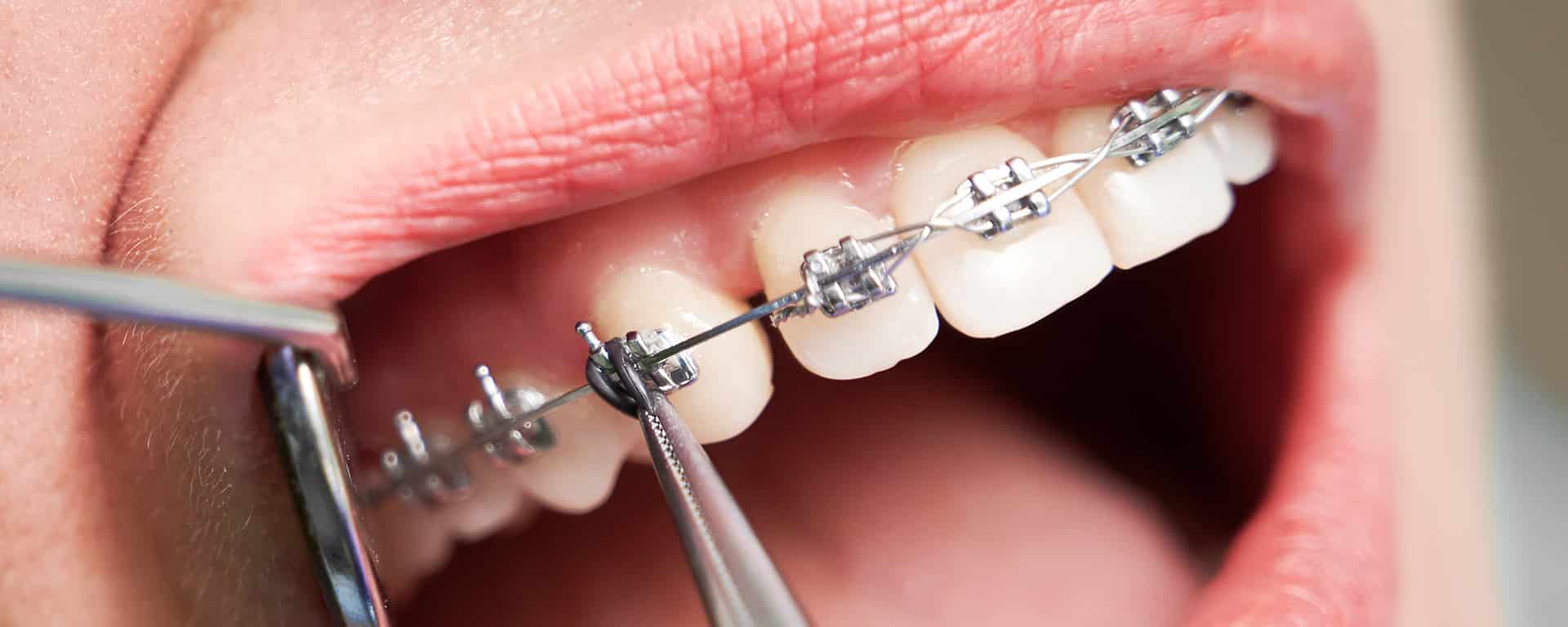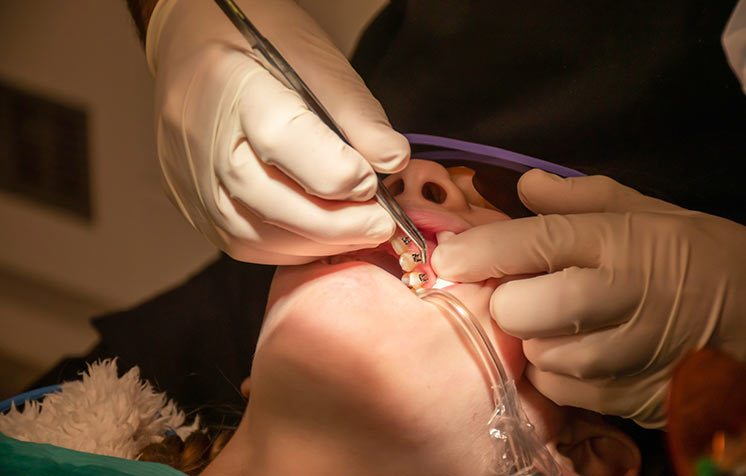Why does my Orthodontic bracket keep falling off?
Oct 2, 2017
Getting braces is not an easy task as your mouth needs to get adjusted to a few pieces of metal fastened onto your teeth. These braces need to stay intact within your mouth for about eight to twelve months to achieve the desired results. In your pursuit for a beautiful smile what can be more frustrating than the bracket falling off!
Well, it is important to understand the reason for the brackets to fall off. Once you understand the cause you can take the necessary measures to prevent it from occurrence.
There are several reasons why this might happen, and it is something that happens more often than you might think.
Common issues with Orthodontic Brackets
Orthodontic brackets play a crucial role in aligning your teeth and achieving that perfect smile. However, they are not immune to issues.
One common problem orthodontic patient encounter is brackets that keep falling off. This can be incredibly frustrating, as it not only disrupts your treatment progress but also causes discomfort and inconvenience. Understanding the common issues with orthodontic brackets can help you troubleshoot the problem effectively.
There are several reasons why brackets may become loose or fall off.
- Poor bonding techniques
During the initial placement of the brackets, the orthodontist uses a special adhesive to attach them to your teeth. If the bonding process is not done properly, the brackets may not adhere securely, leading to frequent dislodgement. - Eating the wrong foods
Certain hard or sticky foods can exert excessive pressure on the brackets, causing them to come off. Poor oral hygiene and inadequate care of the brackets can also weaken the bond over time. - The tooth
In some cases, the tooth itself is responsible for a detached bracket. The teeth with enamel defects cannot bond with the bracket as strongly as a tooth with normal enamel can. - Biting pattern
Another reason can be the biting pattern of the wearer. While placing the brackets the orthodontist makes the wearer bite to check if the brackets are coming in way of the bite. Some individuals bite in different patterns at different times. This can cause the bite to fall directly on the bracket and end up in dislodgement.
How to fix loose brackets at home
While it’s always recommended to consult your orthodontist for any bracket issues, there are a few steps you can take at home to temporarily fix loose brackets. However, it’s important to note that these are temporary solutions and should not replace professional assistance. Here’s what you can do to address loose brackets:
- Identify the loose bracket
First, carefully examine your braces in the mirror to identify the exact bracket that has come loose. It’s essential to be gentle during this process to avoid causing further damage. - Reposition the bracket
Using clean and disinfected tweezers, try to reposition the loose bracket back into its proper place. Gently slide it along the wire and press it against your tooth surface. Be careful not to use excessive force, as it can damage the bracket or wire. - Apply dental wax
If the bracket continues to feel loose or causes discomfort, you can temporarily secure it in place using dental wax. Take a small piece of dental wax, soften it in your hands, and mold it around the loose bracket. This will provide stability and prevent further movement. - Contact your orthodontist
After implementing these temporary fixes, it’s crucial to contact your orthodontist and schedule an appointment as soon as possible. They will assess the situation, determine the underlying cause of the loose bracket, and provide a long-term solution.
When to seek professional help
While it’s understandable to want to fix loose brackets on your own, it’s important to know when to seek professional help. Attempting to fix complex bracket issues without the guidance of an orthodontist can lead to further complications and delays in your treatment. Here are some scenarios where it’s best to consult your orthodontist:
- Multiple loose brackets
If you have multiple brackets that keep falling off, it may indicate a more significant issue with the bonding technique, or the adhesive used. Your orthodontist can assess the situation and determine the best course of action. - Recurring bracket problems
If you consistently experience bracket issues despite following proper care and dietary guidelines, it’s crucial to consult your orthodontist. They can evaluate the underlying cause and implement a solution that addresses the root of the problem. - Discomfort or pain
Loose brackets can cause discomfort and even lead to injuries inside your mouth. If you experience significant pain or discomfort, it’s essential to seek professional help immediately. Your orthodontist can alleviate the pain and address the bracket issue effectively. - Damage to brackets or wires: If a loose bracket causes damage to other brackets or wires, it’s imperative to consult your orthodontist. They will assess the extent of the damage and provide the necessary repairs or replacements.
Remember, your orthodontist is your best resource when it comes to bracket issues. They have the expertise and experience to diagnose and address any problems you encounter during your orthodontic treatment.
Prevention Tips
Prevention is always better than a cure, and the same holds true for bracket issues. By following these prevention tips, you can minimise the chances of experiencing loose brackets and ensure a smooth orthodontic journey:
- Follow dietary guidelines
Pay close attention to the foods you consume and avoid anything that could damage your brackets. Hard and sticky foods are the main culprits, so avoid items like popcorn, ice, and caramel. - Practice good oral hygiene
Brush and floss regularly, paying extra attention to the areas around your brackets. This will help remove plaque buildup and prevent the adhesive from weakening. - Attend regular check-ups
Regular visits to your orthodontist are essential for monitoring your progress and addressing any bracket issues promptly. Don’t skip these appointments, as they play a vital role in maintaining the health and stability of your braces. - Communicate with your orthodontist
If you have any concerns or questions about your braces, don’t hesitate to reach out to your orthodontist. They are there to support you throughout your treatment and can provide valuable guidance to ensure a successful outcome.
FAQs
- Can I fix a loose bracket myself?
While there are temporary fixes you can try at home, it’s always best to consult your orthodontist for any bracket issues. They have the expertise to address the problem effectively and provide a long-term solution. - How long does it take to fix a loose bracket?
The time it takes to fix a loose bracket will vary depending on the severity of the issue. In some cases, it can be resolved during a regular check-up appointment, while others may require a separate visit for repair or replacement. - Can I continue eating with a loose bracket?
It’s best to avoid eating with a loose bracket to prevent further damage or discomfort. Stick to soft foods and contact your orthodontist as soon as possible to address the issue. - Will loose brackets affect my treatment progress?
Loose brackets can disrupt your treatment progress if left unaddressed. It’s important to consult your orthodontist promptly to ensure that your treatment stays on track. - Can I still play sports with a loose bracket?
Engaging in physical activities, especially contact sports, with a loose bracket can increase the risk of further damage. It’s best to consult your orthodontist and follow their advice on sports activities during your treatment.
Importance of understanding and addressing bracket issues
Orthodontic brackets are an integral part of your orthodontic treatment, and it can be incredibly frustrating when they keep falling off. However, by understanding the common issues, knowing how to troubleshoot problems, and following preventive measures, you can minimise the chances of encountering bracket issues.
The best way to avoid the falling off brackets is to adhere to your orthodontist’s directions. Stand in front of your mirror while brushing your teeth and check the condition of your braces carefully. This way you can appreciate minor changes in position instantly.
If you find that a bracket has become loose or has come out, fix an appointment with your orthodontist to get it fixed.










